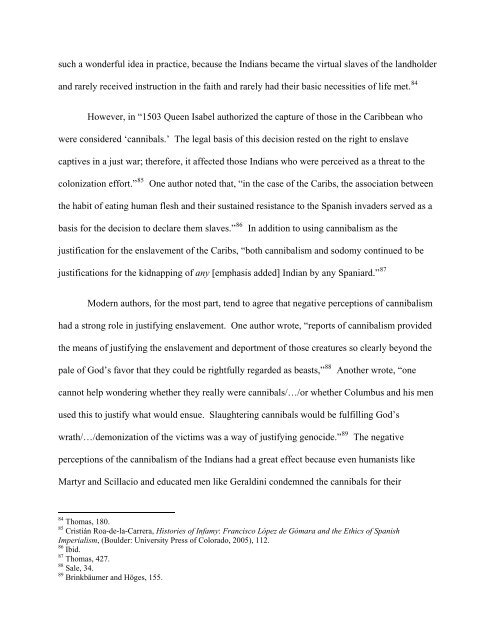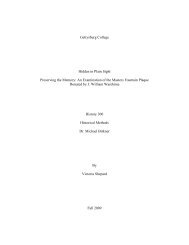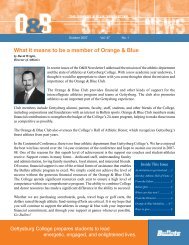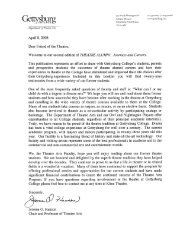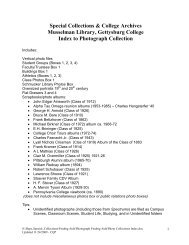Sweet Tooth for Empire: Sugar and the British Atlantic World
Sweet Tooth for Empire: Sugar and the British Atlantic World
Sweet Tooth for Empire: Sugar and the British Atlantic World
Create successful ePaper yourself
Turn your PDF publications into a flip-book with our unique Google optimized e-Paper software.
such a wonderful idea in practice, because <strong>the</strong> Indians became <strong>the</strong> virtual slaves of <strong>the</strong> l<strong>and</strong>holder<br />
<strong>and</strong> rarely received instruction in <strong>the</strong> faith <strong>and</strong> rarely had <strong>the</strong>ir basic necessities of life met. 84<br />
However, in “1503 Queen Isabel authorized <strong>the</strong> capture of those in <strong>the</strong> Caribbean who<br />
were considered ‘cannibals.’ The legal basis of this decision rested on <strong>the</strong> right to enslave<br />
captives in a just war; <strong>the</strong>re<strong>for</strong>e, it affected those Indians who were perceived as a threat to <strong>the</strong><br />
colonization ef<strong>for</strong>t.” 85 One author noted that, “in <strong>the</strong> case of <strong>the</strong> Caribs, <strong>the</strong> association between<br />
<strong>the</strong> habit of eating human flesh <strong>and</strong> <strong>the</strong>ir sustained resistance to <strong>the</strong> Spanish invaders served as a<br />
basis <strong>for</strong> <strong>the</strong> decision to declare <strong>the</strong>m slaves.” 86 In addition to using cannibalism as <strong>the</strong><br />
justification <strong>for</strong> <strong>the</strong> enslavement of <strong>the</strong> Caribs, “both cannibalism <strong>and</strong> sodomy continued to be<br />
justifications <strong>for</strong> <strong>the</strong> kidnapping of any [emphasis added] Indian by any Spaniard.” 87<br />
Modern authors, <strong>for</strong> <strong>the</strong> most part, tend to agree that negative perceptions of cannibalism<br />
had a strong role in justifying enslavement. One author wrote, “reports of cannibalism provided<br />
<strong>the</strong> means of justifying <strong>the</strong> enslavement <strong>and</strong> deportment of those creatures so clearly beyond <strong>the</strong><br />
pale of God’s favor that <strong>the</strong>y could be rightfully regarded as beasts,” 88 Ano<strong>the</strong>r wrote, “one<br />
cannot help wondering whe<strong>the</strong>r <strong>the</strong>y really were cannibals/…/or whe<strong>the</strong>r Columbus <strong>and</strong> his men<br />
used this to justify what would ensue. Slaughtering cannibals would be fulfilling God’s<br />
wrath/…/demonization of <strong>the</strong> victims was a way of justifying genocide.” 89 The negative<br />
perceptions of <strong>the</strong> cannibalism of <strong>the</strong> Indians had a great effect because even humanists like<br />
Martyr <strong>and</strong> Scillacio <strong>and</strong> educated men like Geraldini condemned <strong>the</strong> cannibals <strong>for</strong> <strong>the</strong>ir<br />
84 Thomas, 180.<br />
85 Cristián Roa-de-la-Carrera, Histories of Infamy: Francisco López de Gómara <strong>and</strong> <strong>the</strong> Ethics of Spanish<br />
Imperialism, (Boulder: University Press of Colorado, 2005), 112.<br />
86 Ibid.<br />
87 Thomas, 427.<br />
88 Sale, 34.<br />
89 Brinkbäumer <strong>and</strong> Höges, 155.


